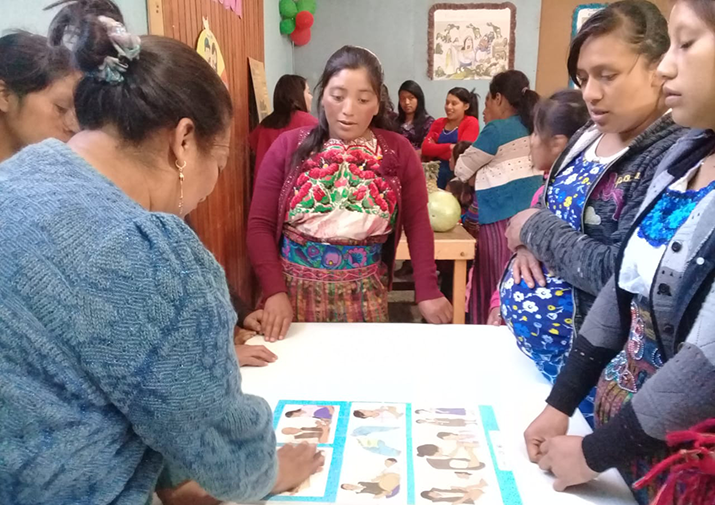We Will Not Let Antenatal Care Services Falter
We Will Not Let Antenatal Care Services Falter

The COVID-19 pandemic has affected every facet of daily life in Guatemala, including women’s access to antenatal care services (ANC). Under normal circumstances, MSH’s Strengthening Antenatal Care for Mayan Women Project, supports group ANC sessions, providing a safe space for women to receive peer support and accurate health information with the guidance of a nurse.
However, with the current government restrictions in place due to the COVID-19 pandemic, it is no longer possible to meet. Yet comadronas, or traditional birth attendants, are adapting to provide essential ANC services and social support to pregnant women who may be scared and isolated, saving lives and re-imagining health services.
Guatemala’s national maternal mortality ratio is the sixth highest in the Americas. In the Quetzaltenango department, indigenous women bear a higher burden of maternal mortality due to harsher economic circumstances, higher fertility rates, and poorer access to convenient and culturally respectful health services.
To offer culturally respectful ANC group sessions, nurses typically co-facilitate the pregnancy groups with community health workers in K’iche and Mam, the two Mayan languages spoken in the region. Comadronas attend group sessions and encourage women in the community to join the pregnancy groups.
Comadronas, usually elderly women who serve as health leaders in the Mayan community, provide prenatal to childbirth care. They visit a pregnant woman’s home to examine her state of health and the position of her baby, massage her, help her bathe, and give advice about diet. They refer women to health services for prenatal vaccinations or if there are any signs of danger.
During the COVID-19 pandemic, comadronas have a critical role to play in safeguarding the health of mothers and newborns, as many pregnant women fear visiting health facilities. Official government statistics show an increase in at-home childbirths; from January to March 2020, 73% of deliveries in the Quetzaltenango department were attended by a comadrona in the home, while only 25% were at a health facility.
![[Comadronas conduct home visits to counsel pregnant women due to fear around coronavirus. Photo credit: MSH staff]](https://msh.org/wp-content/uploads/2020/05/3_0.jpg)
Yet, according to Gustavo Barrios Izaguirre, MSH’s Maternal and Child Health Advisor for the project, “They [pregnant women] are really scared and messages are getting mixed at the community level. There are strict no movement orders in place, to the extent that comadronas and mothers in labor are afraid to leave their houses for fear of getting into trouble with the police.” To continue supporting ANC services in the Mayan community, Izaguirre and project staff are working with the comadronas to reach out to pregnant women and share key messages on maintaining a healthy pregnancy and promoting proper hygiene.
Guidance is also being provided to comadronas on how to work with local authorities, including carrying their government-issued comadrona identity card so that they are able to safely attend deliveries, even during overnight curfew hours, without risk of arrest. Because comadronas have to purchase supplies with their own money, MSH staff are working with local partners to procure more protective equipment, such as gloves and masks. Using mobile phones and WhatsApp, MSH keeps in contact with comadronas to provide social-emotional support services, share information on maintaining a healthy pregnancy, follow up on prenatal care, help triage women needing referrals to clinics, and clarify misinformation and key public health messages on COVID-19.
Maintaining essential ANC services, communicating accurate information, and providing social support to pregnant women who are frightened to leave their homes is crucial during this pandemic. None of this could have been done without the dedication of the comadronas, who continue to support the women and children in their community.